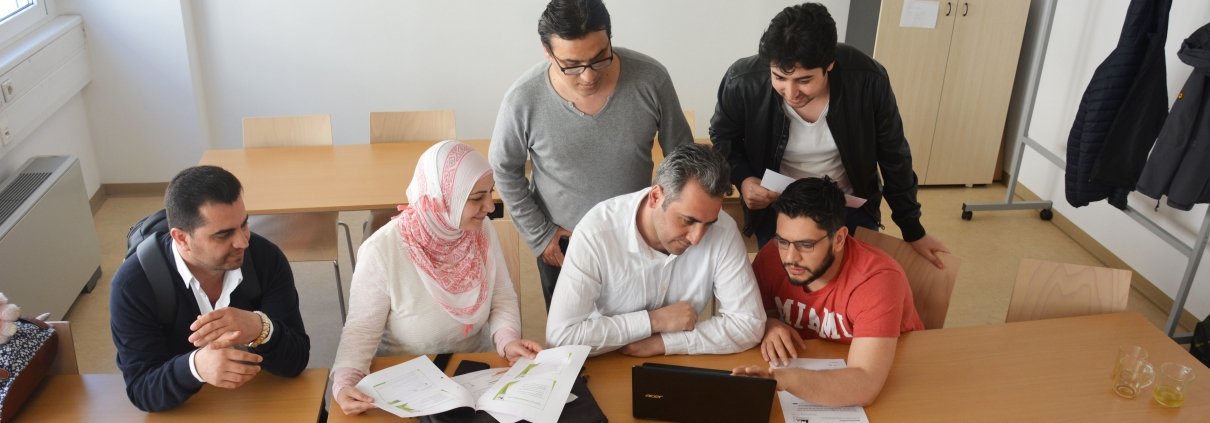Participatory Research and Needs Assessment to Develop the Certificate Course: Basics in Education Studies for Teachers with Refugee Background
Excerpt
The certificate course "Educational Science Fundamentals for Teachers with a Refugee Background" is aimed at teachers with flight experience who already have a residence permit (asylum or subsidiary protection) as well as very good German language skills (at least B2.2 level).
Narrative, origins and objectives of the initiative
What kind of project is this? Please give a short description (summary) of it.
Following an inquiry from UNHCR (UN High Commissioner for Refugees) of whether the University of Vienna could install (re-)qualification measures for recently immigrated teachers, similar to Sweden and Germany, a small group of researchers started investigating and assessing the needs of former secondary school teachers who had to flee their countries of origin. These findings led to the design of a project application with BMEIA (Federal Ministry Republic of Austria for Europe, Integration and Foreign Affairs), aiming to set up a certificate course providing training in education as a way to re-enter former professions as a subject-teacher. As the education background of the target group was not considered equal to teacher qualification programmes in Austria, the group had to qualify further in this area. Most of them used to study only one subject, whereas teacher education in Austria consists of 2 subjects, practical experience, and basics in education studies. The latter is now provided through a specific course for the target group.
Please tell us why, in general, this project is considered a successful one?
The first course shows a drop-out rate of 0% and all 23 participants graduated successfully. The course development was anchored by a participatory needs-assessment and many networks activated and collaborated well.
And why would you consider it a grass-roots initiative?
The initial idea to install such an programme was brought up by UNHCR. Since then assessment and research activities were driven by participatory activities (within institutional frameworks as far as possible).
What challenges needed to be solved in this project?
Integration of professionals with refugee background in the teacher vocation, an area where there is a lack of qualified professional in an ever-increasing diverse school system in Austria.
There were a couple of challenges within the project structure and realization. A primary one was to locate the target group in the onset phase of the project as secondary school teachers with a refugee background were not registered as teachers according to the Austrian legislation. This was due to their different training backgrounds – e.g. in Austria, two subjects are required and most of the participants have only one.
Is this initiative based on any particular theoretical framework? Which one?
Participatory and inclusive research.
(Appendix) Is your intervention standing on its own or is it a part of a bigger and more holistic approach?
Please describe the group(s) intended as beneficiaries of this initiative
Why has this group (have these groups) been chosen?
Researchers are based at the Center of Teacher Education and the Department of Education. Needs of a more diverse teacher population in secondary education have been identified to answer challenges related to teacher shortage and diversified student populations.
Could you please tell us something about the relative size of the (of each) target group, within the school/university population, region and/or country?
Each course is attended by 23 participants, therefore 46 actual beneficiaries. Nevertheless, many applicants received information on alternatives in the area of pedagogy (there are not many) and guidance where possible. Additionally, other stakeholders as well as the organizers of the project benefit from exchange and networking.
Which social characteristics are taken into account and what is the geographical area covered?
Geographical focus: Vienna, Upper Austria, and Burgenland, as well as persons with asylum or subsidiary protection who have been working as teachers in secondary schools in their home countries.
On which level is the project implemented?
Please describe the political and socio-economic factors that you believe have been important enablers for your initiative
Did the initiative have political support?
First course and anchoring research activities were funded by BMEIA (Federal Ministry Republic of Austria for Europe, Integration and Foreign Affairs).
How did it fit with local, regional or national policies?
In Austria there is, in general, a teacher shortage in specific subjects. The course offers part of the regular teacher training that cannot be attended by the target group as this would imply benefit cuts.
Who are the stakeholders supporting the initiative?
Next to the funding by BMEIA, AMS (Service for job seekers ) and CORE (Integration at the center) supported the first course.
Are there particular demographic changes present that are influencing the project?
Further courses will most likely not take place as no additional teachers can enter Austria.
What is the institutional strategy and culture of the (educational) organization?
- Higher Education Institution.
- Initial initiative by early researchers.
To what extent does the initiative have an influence on institutional policy (or potential influence) of the (educational) organization?
The initiative serves as an example of third mission activities (citizen science) and networking (See also: https://thirdmission.univie.ac.at/en/third-mission-activities/).
(Appendix) Is there public support for your initiative and the issue it addresses?
(Appendix) What other factors do you think have been important for the success of this initiative?
Please describe the overall initiative design and the methods and tools used to reach the goals
Please describe the specific activities carried out.
- Participatory needs assessment
- Development of course curriculum
- Installation of course
- Anchoring participatory research
- Data analysis
- Support of alumni
- Searching for funding for the installation of the second course
What were the key roles (teacher, student, management team etc.) within the project?
Early researchers, (prospective) participants/target group, admin support, internal and external network.
What ideas, tools, theories, models, methodology (etc.) have been used to reach the goals?
See above
What are the final revenues of the project?
Please describe if your project ensured its sustainability
If so, how did you ensure the short-term impact of the project?
Precarious funding and a second course that was made possible through engaged civil society and donations.
And how did you ensure the long-term impact of the project?
Support of Alumni.
Has your project been replicated elsewhere?
Please tell us about the resources used in this initiative
What was the budget for the initiative?
Approx. 70.000€ per year
How much did the initiative depend on volunteers?
How were the costs perceived by the public/the sector/other stakeholders?
To what extent did the initiative achieve its objectives?
Please describe the evidence to support the success of your initiative.
Participatory research findings, drop-out rate and success, media coverage etc.
Did the intervention lead to any unintended (positive) outcomes?
International collaboration (between Cologne and Stockholm among others), as well as national exchange (new courses in Linz, Graz and Vorarlberg/Tirol) that are being planned.
What indicators (quantitative and qualitative) have you measured to demonstrate success?
There was a 0% drop-out rate and successful graduation of all participants, publications and motivation levels of all partners involved.

 Copyright: Camilla Pellech, Postgraduate Center der Universität
Copyright: Camilla Pellech, Postgraduate Center der Universität
 Copyright by Mili Flener
Copyright by Mili Flener



 Sale für Alle 2018
Sale für Alle 2018